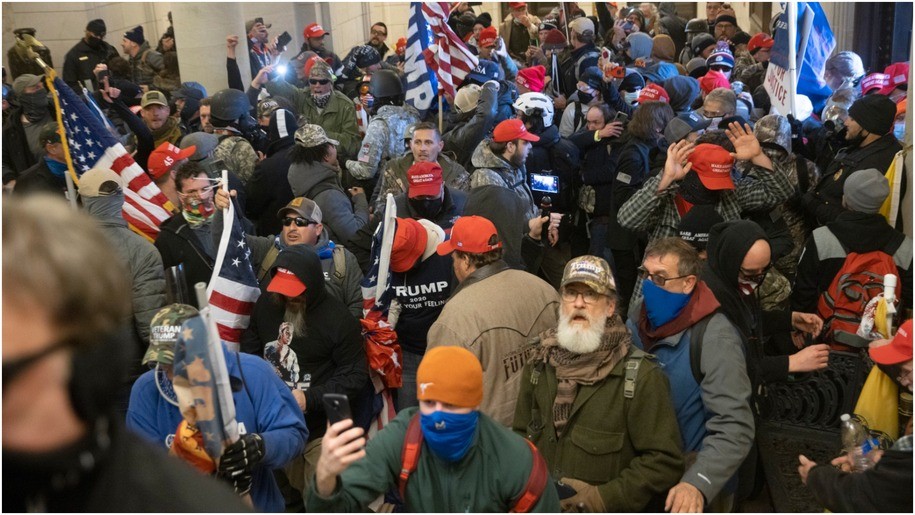[ad_1]

On Wednesday, The Washington Post had a rundown of the (ahem) economic troubles prevalent among those arrested for attempting a violent insurrection inside the U.S. Capitol, and it’s been getting (ahem) quite a bit of pushback on the internets because there are a great, great many people inside the United States of Pandemic right now who are in considerably more dire economic distress than any of these violent delusional processed cheese slices and have never even contemplated attempting to kidnap members of the presidential line of secession in order to overturn an election that some faux-rich narcissistic con artist thought he could overturn if he stacked up enough bodies and pushed them through the right doors.
The short version of the Post‘s reporting: “Nearly 60 percent” of those charged so far in the wake of the January 6 insurrection “showed signs of prior money troubles,” from bad debts to evictions to unpaid taxes. That includes the Texas realtor now infamous for taking a private plane to an attempted coup, who is “still paying off a $37,000 lien for unpaid federal taxes” and had previous tax problems a decade earlier.
From there, we get some discussion as to whether these money troubles contributed to the radicalization of this confederacy of assholes, and the reminder that “business owners and white-collar workers” made up a goodly chunk of the seditionists, and that this too matches up with previous research on past far-right extremist groups. What’s not evident is whether 60% of any group of random Americans could be shown to have money troubles in the last decade, given that we had just come out from a massive recession and are currently in another one.
It makes perfect sense that those participating in semi-organized militias would be middle or upper class seditionists, because you have to have a fair wad of disposable income in order to buy a roomful of weapons, ammo, and associated militia funtime cosplay gear. It makes a lot of sense that the people most devoted to Donald Freaking Trump would be people who also played fast and loose with tax laws, or people who were more prone than not to skipping out on their debts.
If you want proof of either of those, you needn’t go farther than your average pro-Trump boat parade. These aren’t necessarily people who are economically suffering. They might be people more familiar than most with trying to get away with financial malfeasance.
What is self-evident is that the Trumpian right, like all far-right movements, is a reactionary movement made up of people who feel the world has wronged them in some not necessarily coherent way and who are extremely susceptible to suggestions that it is the fault of ethnic minorities, religious minorities, or both. If they have a tax lien on their properties (even while most of those around them don’t have any property to put under lien in the first place), it must be because migrants have it Too Good These Days. If they lose their jobs due to a pandemic, they are not willing to entertain the notion that it was mere genetic happenstance that let such a thing loose—it must have been an intentional plot by The Communists.
Many, if not the vast majority, of Americans have faced financial problems in their lifetimes. Few turn into flag-waving, government-attacking fascists.
So this may be barking up the wrong tree, as far as attempting to find a connection between fascist Trump supporters and the alleged economic anxieties, rather than white supremacy-based authoritarianism, that drove them to such a point. A far more solid predictor of violence remains the obvious one: Already having a past history of violence. Those who resort to violence to solve their own personal problems are already predisposed to look to violence to solve the larger problems too; both the “Proud Boys” and dozens upon dozens of far-right militias demonstrate what happens when the violence-eager find each other, get gallons upon gallons of booze into their bloodstreams, and start looking to act out on their inner fantasies.
If there is anything that truly binds those assembled by Trump to act as the bodies in his attempted overthrow of government, however, it is a seemingly unending gullibility, a willingness to follow pleasing delusions over less pleasing realities, and above all a reversion to something between childlike denial and genuine stupor when called to account.
These are grown adults, with jobs and checking accounts and phone bills to pay. You wouldn’t know that from their court pleadings, which have tended to portray each of them as young gullible wisps who floated into the U.S. Capitol, under the smoke of tear gas and over the bodies of police and protesters alike, because a breeze just happened to blow them that direction.
Yeah, these do seem to be the sort of people who would find themselves in trouble more often than most, financial or otherwise. I mean, look at them.
[ad_2]
Source link